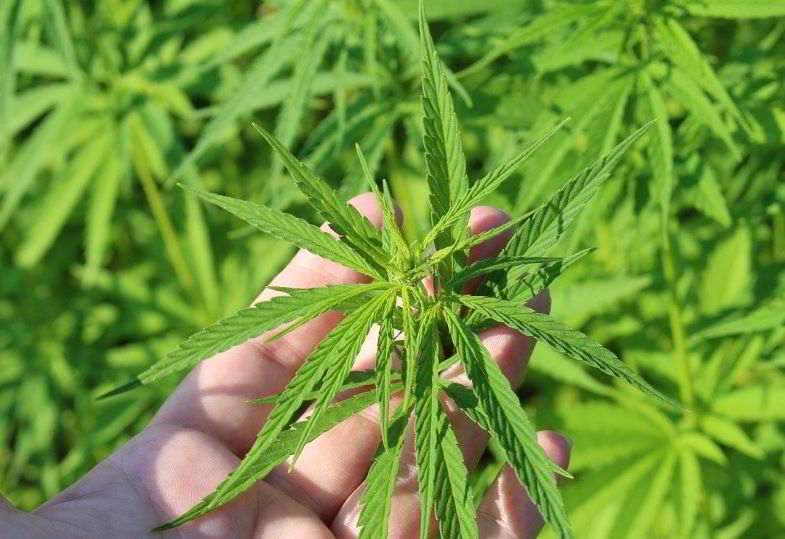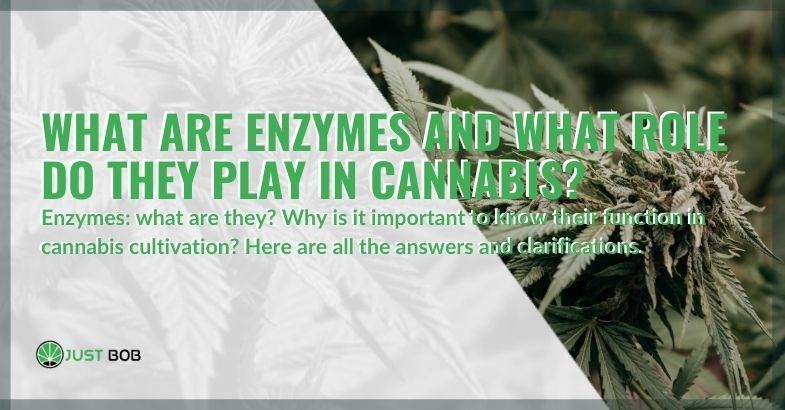Modified on: 20/02/2025
Enzymes: what are they? Why is it important to know their function in cannabis cultivation? Here are all the answers and clarifications.
If you’ve ever heard of enzymes in connection with CBD cannabis, other crops or in other contexts, there’s a good reason: enzymes are everywhere in nature.
As far as cannabis is concerned, these molecules promote plant health, increase plant productivity and aid the uptake of nutrients.
But what are enzymes specifically?
Why are they so important?
In the following paragraphs, we will examine the role of these mysterious molecules, focusing in particular on what they can do in the area of cannabis cultivation and legal cannabis.


Let’s discover the enzymes: what are they?
Enzymes are proteins found in both animals and plants that act as catalysts. Basically, they facilitate the chemical reactions of the molecules to which they bind in order to facilitate the absorption of nutrients.
Our bodies also possess enzymes: they are present in saliva, in the stomach, and in many other areas essential to the process of digestion, and here too they play the role of breaking down food into easily absorbable nutrients.
The role of these microscopic proteins is also the same in legal hemp plants.
Enzymes have a fairly complex three-dimensional structure and have particular areas called “active sites”.
When a substrate binds to the active sites of enzymes (according to the key-lock principle), an enzyme-substrate complex is formed, which in turn generates a chemical reaction.
As a result of this reaction, the enzyme undergoes a temporary mutation in its structure and ‘molecular products’ are generated.
The enzyme then recovers its original form.
Generally, in nature, a certain type of enzyme is only able to bind and break down particular molecules, but it seems that the “induced adaptation process” has been detected, according to which both enzymes and substrates (even if not exactly compatible) undergo structural mutations in order to bind.
Read also: Organic and cannabis cultivation: here are the advantages compared to non-organic cultivations
The role of enzymes in cannabis cultivation
Having explained in general what enzymes are used for, we will now focus on enzyme activity in cannabis.
In nature, enzymes are already present in the soil, but sometimes the soil is poor in organic material, sometimes it is used for hydroponic cultivation, so adding enzymes is a must.
Do you want examples of enzymes used for growing legal cannabis?
Among the most commonly used plant enzymes are these:
- cellulase;
- beta-glucosidase;
- amidase;
- xylanase;
- hemicellulose
But specifically, what advantages can bring enzymes into cannabis and hemp cultivation?
Well, the positives are many but can be summarised mainly in these 3 points:
- it favours the decomposition of the molecules of the substrate by transforming them into smaller fragments so as to facilitate their absorption;
- it speeds up the disposal of dead cells in the root system, ensuring better health and facilitating the absorption of new nutrients;
- because of what you have read in the previous two points, cannabis plants are able to grow faster and give a good yield.
But is it enough to add enzymes to get quality plants?
As explained above, enzymes play a decisive role if they are able to bind and cooperate with other molecules.


What are enzymes and how do they work? Let’s check on the cannabis plant.
For even greater benefits, enzymes can be combined with other supplements. The most commonly used are molasses, chelated minerals and amino acids.
These interact in perfect harmony with the enzymes to promote the growth and quality of the legal marijuana plant, but in particular:
- Molasses enriches the soil, acts as a natural insecticide and is a valuable source of nutrition for micro-organisms (which in turn support the enzymes);
- chelated minerals are a good source of nutrition for cannabis plants, as they are more soluble than minerals in inorganic form, and by binding to enzymes they support the health and proper nourishment of the root system;
- supplementing enzymes with amino acids, on the other hand, means increasing flower and resin production in hemp plants.
As with all crops, the key with hemp is to find the balance, so that the plant grows luxuriantly, but not too quickly.
If the plant is well nourished and healthy from the roots upwards, the end product (such as hashish) will be rich in aromas, terpenes and everything else that makes the hemp plant ‘quality’.
Read also: Bediol: what you need to know about this medical cannabis strain
Conclusions
As you may have read, knowing the role of enzymes in the cannabis plant is essential in order to ensure their proper needs of the cannabis plant.
These are molecules that allow the plants to grow without nutrient deficiencies, breaking down even the most complex nutrients, and which make it possible to obtain lush and fragrant CBD weed plants.
So, if you are entering the world of hemp and cannabis cultivation, knowing what enzymes are and how they work in combination with other supplements is essential.
Using only fertilisers is often not enough … and sometime it is quite the opposite!
Having said that, in the meantime, if you would like to discover the aromas of legal CBD flowers and also like to collect its derivatives, visit our JustBob.shop online CBD store.
We are waiting for you!









